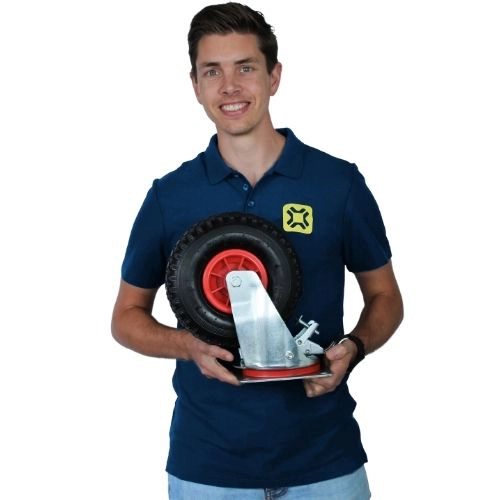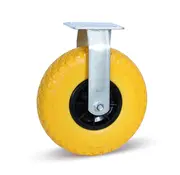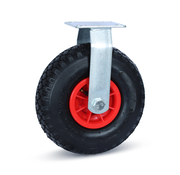Pneumatic tyre wheels
Our Pneumatic tires are perfect for use on rough terrain such as sandy paths, grass, and stones. Ideal for transport carts, beach wagons, and feed carts.
-
Braked swivel castor Anti-leak tyre - Large plate - Plastic rim - 260mm -75kg
£ 57.52(69.02 Incl. VAT)
Compare -
-
Swivel castor Anti-leak tyre - Large plate - Plastic rim - 260mm - 75kg
£ 50.68(60.82 Incl. VAT)
Compare -
-
Swivel castor Anti-leak tyre - Plastic rim - 260mm - 75kg
£ 25.16(30.19 Incl. VAT)
Compare -
-
Braked swivel castor pneumatic tyre - Large plate - Plastic rim - 260mm - 125kg
£ 40.68(48.82 Incl. VAT)
Compare -
-
Swivel castor pneumatic tyre - Large plate - Plastic rim - 260mm - 125kg
£ 34.20(41.04 Incl. VAT)
Compare -
-
Swivel castor pneumatic tyre - Plastic rim - 260mm - 125kg
£ 19.80(23.76 Incl. VAT)
Compare -
-
Fixed castor Anti-leak tyre - Plastic rim - 260mm - 75kg
£ 23.80(28.56 Incl. VAT)
Compare -
-
Bucket wheel pneumatic tyre - Plastic rim - 260mm - 125kg
£ 18.28(21.94 Incl. VAT)
Compare -

Pneumatic wheels for smooth and comfortable transport
Are you looking for wheels that absorb shocks and roll effortlessly, even on uneven surfaces? Then pneumatic wheels are the right choice. These wheels with air-filled tyres ensure a smooth ride, making it easier and more comfortable to transport heavy loads. Pneumatic wheels are ideal for applications such as wagons, beach carts, and feed carts, where grip and stability are important.
What are pneumatic wheels?
A pneumatic wheel is equipped with a rubber outer tyre that, like a bicycle tyre, is filled with air. At Logihub, you'll find both classic pneumatic tyres and PU variants. The PU versions are filled with polyurethane foam, making them puncture-proof and requiring minimal maintenance. Both types absorb surface irregularities, reducing the effort needed to move loads. Pneumatic wheels are therefore ideal for outdoor use and rough terrains.
What is the difference between rubber wheels and pneumatic tyres?
Rubber wheels are an economical choice and are widely used for light transport applications. They offer decent rolling comfort and basic cushioning but have a lower load capacity and may leave marks on sensitive floors. Pneumatic wheels, on the other hand, provide significantly more suspension and comfort. They perform better on soft or rough surfaces like grass, gravel, or sand, where extra cushioning and grip are needed.
What are the advantages of pneumatic wheels?
- Rolling comfort and cushioning: Irregularities are barely felt.
- Good grip: Even on soft or uneven surfaces.
- Suitable for outdoor use: Rain, sand, or gravel are no problem.
- Flexibility: Available as fixed wheels, swivel wheels, or swivel wheels with brakes, making carts easy to manoeuvre.
Usage and load capacity of pneumatic wheels
Pneumatic wheels are ideal for transport carts and other vehicles used outdoors or on rough terrains. Depending on the application, choose the appropriate load capacity:
- 75 kg load capacity per wheel: Suitable for a total load of approximately 225 kg.
- 125 kg load capacity per wheel: Suitable for a total load of approximately 375 kg.
This total load capacity is calculated based on three wheels, as one wheel may 'float' during use and temporarily not make contact with the ground. This ensures that both your object and the load can be transported safely.
If you plan to use the wheels on a cart that needs to manoeuvre well, such as for frequent turning or pivoting, we recommend 2 fixed wheels combined with 2 swivel wheels. Place the fixed wheels on one side for straight-line stability and the swivel wheels (optionally with brakes) on the push/steer side for smooth turning and parking. This way, the cart steers lightly, stays on course, and stands firmly when stationary.
Specifically looking for a wheel for your wheelbarrow? Check out our wheelbarrow wheels category.
Frequently asked questions about pneumatic wheels
Still unsure about choosing the right pneumatic wheels? Below are the answers to the most frequently asked questions to help you make the right choice for your application.
Are pneumatic wheels suitable for all surfaces?
Pneumatic wheels perform best on uneven and soft surfaces, such as gravel, sand, or grass. They provide grip and cushioning, making transport more comfortable. On smooth floors, they can also be used, but often regular rubber or plastic wheels are more practical.
How should you maintain pneumatic wheels?
Regularly check the air pressure and inflate the tyres if necessary for optimal rolling comfort. Keep the wheels clean and free from sharp objects that could cause punctures. For a maintenance-free solution, consider PU pneumatic tyres, which are puncture-proof and require minimal care.
How much should you inflate pneumatic wheels?
The ideal air pressure depends on the wheel and application. In most cases, it should be firm enough to support the weight but with sufficient cushioning for comfort. Regularly check that the pneumatic wheels are adequately inflated for optimal rolling comfort and safety.
Order pneumatic wheels at Logihub
Choose comfort and convenience with pneumatic wheels from Logihub. Order today and benefit from top quality, fast delivery, and competitive prices. Not sure which wheel is best for your situation? Use our handy product finder to find the right pneumatic wheel.









